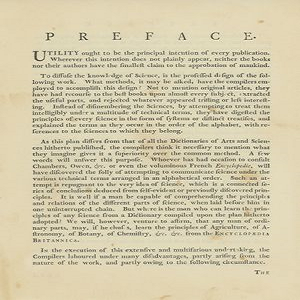Doctor Curmudgeon® Just Look It Up!
By Diane Batshaw Eisman, M.D. FAAP Doctor Eisman is in Family Practice in Aventura, Florida with her partner, Dr. Eugene Eisman, an internist/cardiologist
“Look it up, dear,” was something that I often heard as a child.
I would ask a question of my parents beginning with “why “or “what “and be directed to the Encyclopedia Britannica. Those elegant red covered books occupied a lot of space on our shelves.
My parents believed that if I looked something up, I was more likely to remember it. .
Of course, like many other things, the encyclopedia is now digitized. I was doing some research in Britannica online, when those words “Encyclopedia Britannica” caused me to pause and reflect. I recalled the pleasant childhood hours of thumbing through its pages. I took this great work for granted. But now I wonder how the idea of creating a compilation of current knowledge began?
Two gentlemen of Edinburgh, Colin Macfarquhar, a printer and bookseller and Andrew Bell, an engraver, felt the need for a new kind of encyclopedia. Their plan was to publish an Encyclopedia Britannica. This was the time of the intellectual excitement of the Scottish Enlightenment. From Britannica.com: ”Scottish Enlightenment, the conjunction of minds, ideas, and publications in Scotland during the whole of the second half of the 18th century and extending over several decades on either side of that period. Contemporaries referred to Edinburgh as a “hotbed of genius.” Macfarquhar and Bell planned Encyclopaedia Britannica, in which related topics were arranged into essays and the essays were then organized alphabetically.
And so they hired William Smellie. a Scottish natural historian and publisher. With Smellie’s background as a printer, editor, naturalist, antiquary, and University of Edinburgh lecturer in botany, he was a logical choice to compile the first edition. This massive undertaking appeared as a series of pamphlets of one hundred installments from 1768 to 1771.
The first edition had quite a few inaccuracies such as an article on “Woman” which contained only four words; ‘the female of man.”
Smellie wrote almost the entire first edition by ‘borrowing’ from authors, such as Samuel Johnson, Benjamin Franklin, Voltaire and Alexander Pope. He said that, “I wrote most of it, my lad, and snipped out from books enough material for the printer. With pastepot and scissors I composed it”
Smellie refused to be involved with the second edition. For some bizarre reason, he objected to any sections on biographies.
Smellie writes in the first edition preface, “We will, however, venture to affirm, that any man of ordinary parts, may, if he chuses, learn the principles of Agriculture, of Astronomy, of Botany of Chemistry, &c. &c. from the ENCYCLOPAEDIA BRITANNICA.”
I still look things up on line in Encyclopedia Britannica,
But for an old curmudgeon it is just not as much fun.
Dr. Curmudgeon suggests “Bitter Medicine”, Dr. Eugene Eisman’s story of his experiences–from the humorous to the intense—as a young army doctor serving in the Vietnam War.
Bitter Medicine by Eugene H. Eisman, M.D. –on Amazon
Doctor Curmudgeon® is Diane Batshaw Eisman, M.D., a physician-satirist. This column originally appeared on SERMO, the leading global social network for doctors.
SERMO www.sermo.com
Click Here to Order Boxing Interviews Of A Lifetime By “Bad” Brad Berkwitt

